Jake Gyllenhaal Doesn't Bathe Regularly: How Often Should You Get Clean?
Jake Gyllenhaal is the latest celebrity to confess to bathing less regularly as of late.
Sharing his attitude towards personal hygiene, he told Vanity Fair: "More and more I find bathing to be less necessary."
He added: "I do also think that there's a whole world of not bathing that is also really helpful for skin maintenance, and we naturally clean ourselves."
He's joined the likes of Mila Kunis and Ashton Kutcher, who also admitted to not always showering once a day.
Appearing on Dax Shepard's podcast Armchair Expert in July, Kunis explained that she was never in the habit of washing her body daily as she grew up without hot water.
"When I had children, I also didn't wash them every day. I wasn't that parent that bathed my newborns, ever," she said.

Kutcher added that the parents' attitude to bathing their children Wyatt, 6, and Dimitri, 4, is to give them a shower "if you can see dirt on them... Otherwise there is no point."
Both said that they wash the essential parts of their bodies. Kunis washes her face twice a day as well as her "holes and soles," while Kutcher washes his armpits and genitals daily, occasionally splashing his face with water after a workout.
Twitter users were quick to share memes on the topic, with one user sharing pictures of a shower writing: "Retweet to scare Jake Gyllenhaal."

More celebrities have since weighed in to share that they do have a daily bathing ritual including Dwayne Johnson and Chris Evans, but some doctors appear to have sided with Kutcher and Kunis.
How Often Should I Bathe or Shower?
While many of us will be in the habit of showering daily, medical and cosmetic doctor at Dr Yalda Clinics, Dr. Yalda Jamali told Newsweek there are no hard and fast rules on how frequently you should be washing your body.
"I think this can vary depending on your health and lifestyle.
"If you exercise heavily daily, you should wash off the sweat and dirt post-exercise. And in other cases, for example, if you suffer from dry skin or conditions that could compromise your skin barrier, such as eczema, your dermatologist may advise you to reduce harsh cleansing of your skin."
Consultant dermatologist at Stratum Clinics, Dr. Sasha Dhoat agreed, adding: "If it's hot and humid, you sweat a great deal or are hitting the gym, you may wish to shower everyday.
"[On d]ays individuals don't sweat a lot, or those who live in cooler, drier climates, washing alternate days or every third day may suffice."
Is Washing Too Regularly Bad for My Skin?
Sharing the downside of showering too frequently, cosmetic doctor Dr. Rekha Tailor of Health & Aesthetics in the U.K. added: "Washing the skin too often and for prolonged periods of time can remove the natural oils and affect the natural bacteria that grows there to support your immune system.
"Many experts also suggest that trying not to shower every day will result in improved skin quality, this is because it allows the skin's natural oils to regenerate resulting in skin that retains moisture and hydration better.
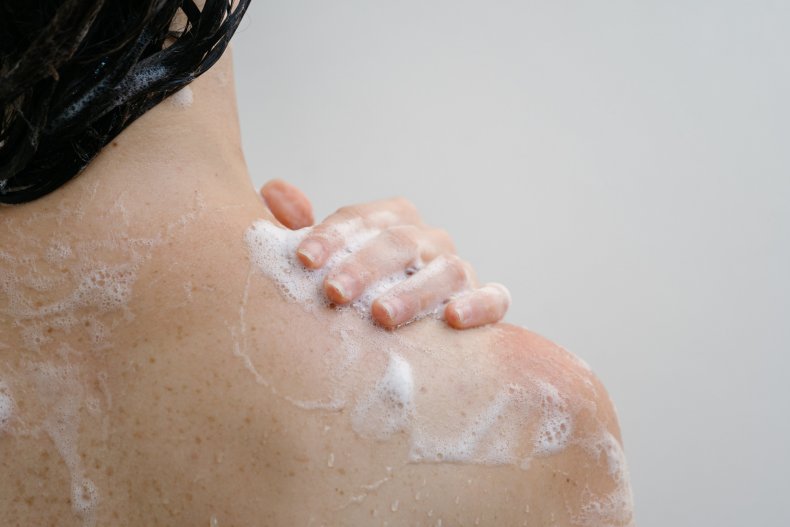
"For people with certain skin conditions such as particularly oily skin or pre-existing conditions such as psoriasis the advice will be different, and largely works on a trial-and-error basis as you observe what works best for your individual skin type."
As the largest organ, it's important to keep your skin clean so it can do its job.
"It protects us from invading pathogens, physical damage and UV exposure. It also acts as a sensory organ and regulates our body temperature," Dr. Jamali explained.
You can think of the top layer of skin as a brick wall, preventing moisture loss and keeping out external aggressors
"Build-up of sweat, dead skin cells, and dirt throughout the day can compromise the skin barrier, trigger breakouts, and exacerbate pre-existing skin conditions."
Frequent washing with harsh soaps can distort your skin's pH levels and compromise your skin barrier. Once your skin barrier is compromised, this can lead to moisture loss and make it easier for pollution particles to penetrate the skin.
Dr. Dhoat said: "You can think of the top layer of skin as a brick wall, preventing moisture loss and keeping out external aggressors, such as chemical irritants and infections.
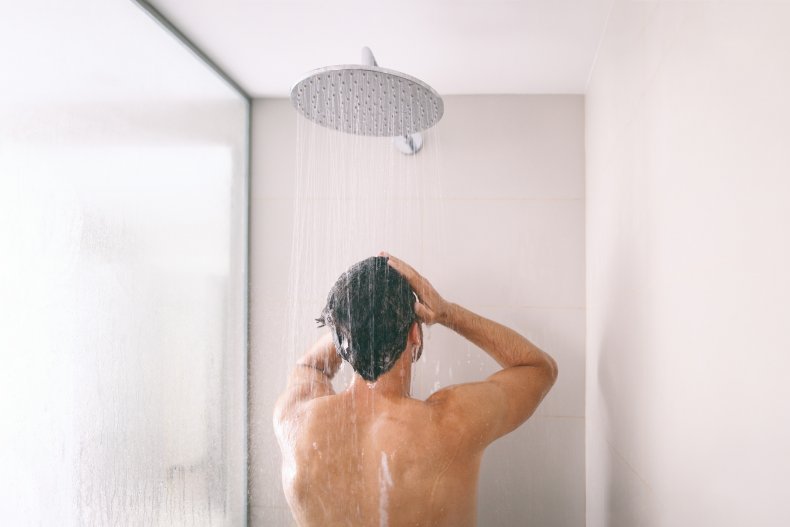
"Over-aggressive skin cleansing, or over-zealous exfoliation in a bid for glowing, clean skin is, in fact, an act of self-sabotage, damaging this brick wall."
"Our skin is made up of a microbiome—this is the term used to describe all the organisms that live on our skin," added Dr. Tailor. "It includes bacteria, fungi and viruses and so on.
"If this [balance of microorganisms] is altered too much with shower gel and over-washing, the skin can lose its natural defense mechanisms and affect the immune system so that the skin is more prone to problems such as dryness, infections and sensitivity."
According to Dr. Jamali, the signs that you may have been bathing too regularly include itching, inflamed and irritated, dry skin and a flare-up of any skin conditions.
Should Children Bathe Daily?
While to some, Kutcher and Kunis' cavalier attitude to bathing their children might sound worlds apart from their own kids' hygiene routines, it can be beneficial for children to bathe less regularly than adults.
The American Academy of Dermatology advises that children aged 6 to 11 need only clean their bodies once or twice a week, or when they're dirty, sweaty, have body odor or have been in a body of water.
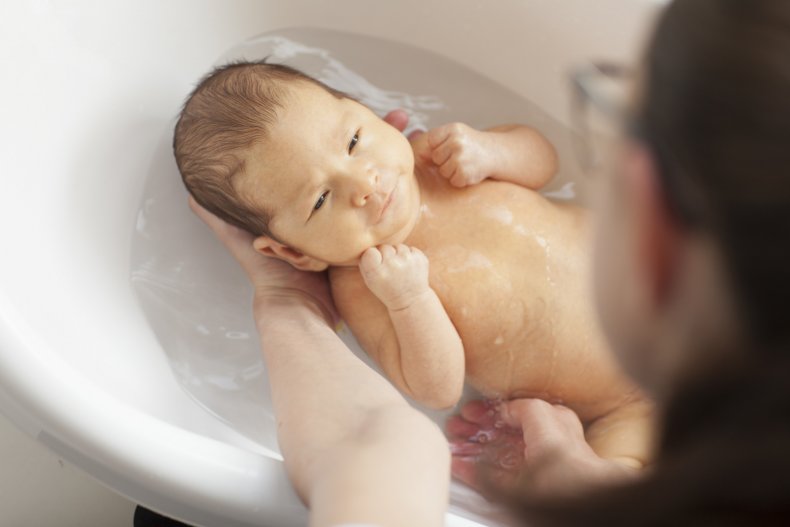
For babies in particular, it's recommended that parents don't wash their skin daily.
"This is because they have fragile skin, and too much bathing can dry the skin out," Dr. Tailor said.
Instead, Tailor suggested this: "You can wash your baby with a sponge, and use a damp cotton pad to wash their face, then one cotton pad for each eye, keeping them clean and making sure infections aren't spread.
"In general, there is no hard and fast rule for how often you wash toddlers and children. If daily bathing works best for you, then that's fine, but a few times a week is probably the optimum amount in terms of cleanliness and maintaining optimum skin health."
Getting dirty every now and then is generally considered good for children as Dr. Jamali explained: "There is strong evidence to suggest that exposing kids to germs can offer a degree of protection against allergies and conditions such as eczema and asthma."
Once children hit puberty, however, it's a good idea for them to start having a daily bathing practice.
"Hormonal changes will increase sweat production as sweat glands become more active.
"Body odor, especially in this age category, can become problematic and affect self-confidence and self-esteem," Dr. Jamali continued.
What's the Best Way to Wash My Body?
If like Gyllenhaal, you don't opt for a daily shower, you could copy Kunis' routine of regularly washing your armpits, feet, genitals, and any other areas where you sweat more.
"Washing these areas daily would be sensible to keep body odor minimal and better controlled," Dr. Jamali said.
When washing genitals, it's important just to use lukewarm water, as Dr. Jamali explained: "Soaps are not needed for these areas and can distort the pH balance and lead to further problems."
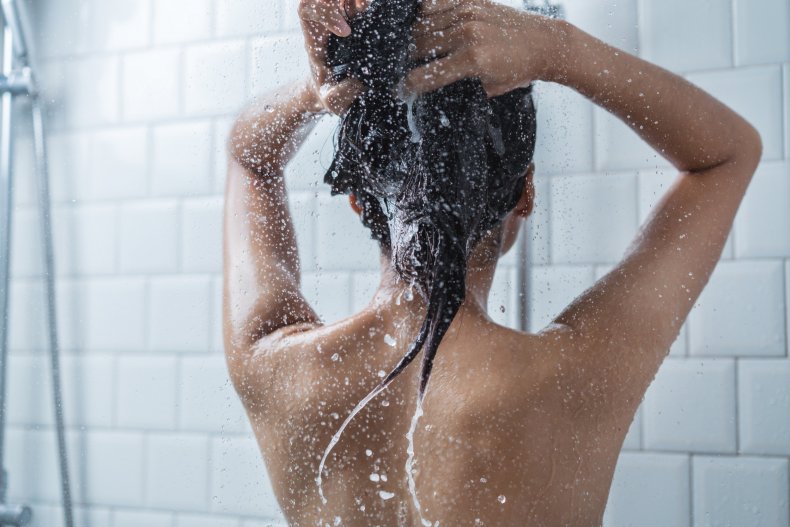
She also recommended avoiding washing your hair daily and keeping your showers to no longer than 10 minutes.
If you're not sure how long it's been, Dr. Dhoat said that once the soles of your feet have become wrinkly, it's time to get out.
"Water can be very drying on the skin," she said. "If feet go 'pruney,' it's been too long and the skin barrier has been compromised.
"I would suggest the shortest time possible, get clean and get out."
It's for this reason that Dr. Tailor recommended opting for a shower rather than a soak in the bathtub.
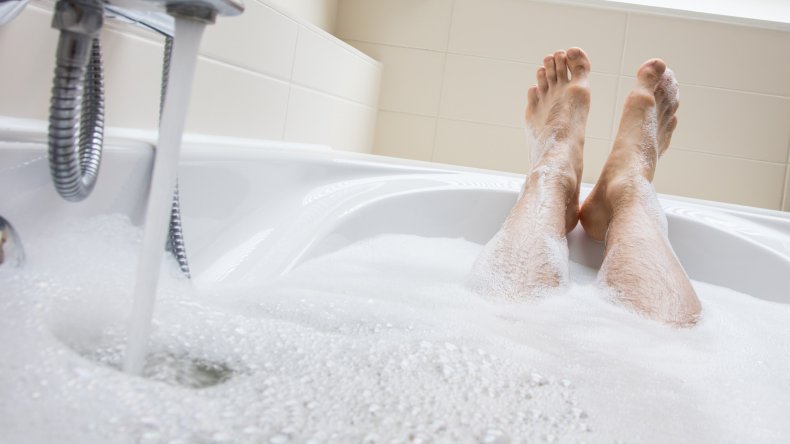
Time of day may also be important as she elaborated: "It's believed that showering in the evening is better for your skin health for a number of reasons because it cleans the skin before you go to sleep.
"In doing this it removes the dirt from the air which includes germs, pollution and dust which can gather during the day, as well as sweat which accumulates. By showering at night you are cleansing your skin of these before you go to sleep, thus enabling it to properly regenerate overnight."
As sleep is crucial for skin regeneration, Dr. Tailor said this can help avoid waking up with clogged pores which can lead to whiteheads, blackheads and acne breakouts.
Unless you have a skin condition that requires specific attention, a moisturizing soap should be all you need to get your body clean.
"Things like loofahs and mitts can be an effective way of dislodging the buildup of dirt and debris that can get lodged in the skin's pores, however great care needs to be paid to ensure you don't over scrub," Dr. Tailor explained.
She recommended exfoliating two to three times a week to remove dead skin cells.
"There are two types of exfoliation. Manual [i.e. scrubbing] or chemical. I recommend chemical exfoliation over mechanical because I find that people often over-scrub, which can traumatize and damage their skin.
"Look for products that contain glycolic, lactic, malic, and salicylic acids to achieve glowing skin."

